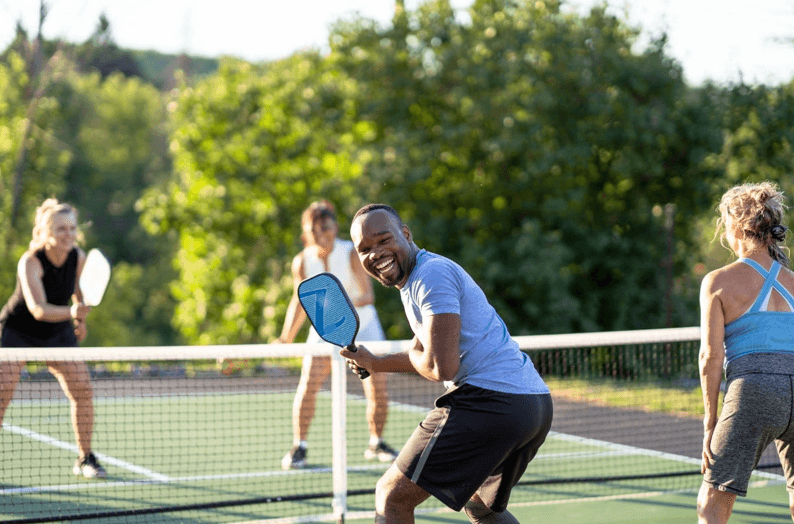
Pickleball, a sport that blends elements of tennis, badminton, and ping-pong, has exploded in popularity for good reason. Not only does it offer physical benefits such as improved coordination, agility, and cardiovascular fitness, but it also brings unexpected advantages for mental health. The game isn’t just a great way to stay active—it also nurtures cognitive function and emotional well-being.
As a game of quick reactions, focus, and strategy, pickleball exercises the brain in a way that few other activities do. By regularly engaging in the sport, players are giving their minds the kind of workout that promotes long-term cognitive health.
Pickleball and Cognitive Stimulation
One of the primary ways pickleball aids mental function is by challenging cognitive skills. Unlike activities that become repetitive or automatic, pickleball requires split-second decisions, strategic thinking, and constant mental agility. The unpredictable nature of the game—where the ball can change speed or direction in an instant—forces players to sharpen their focus and adapt quickly. This kind of mental exercise is crucial for maintaining brain health, especially as we age.
Research shows that engaging in mentally stimulating activities can help ward off cognitive decline and improve memory. Pickleball achieves this by combining physical movement with mental tasks, like anticipating an opponent's shot or deciding where to place the ball. Such tasks activate different regions of the brain, keeping it sharp and resilient. This constant mental engagement can be particularly beneficial for older adults looking to preserve cognitive function and delay the onset of conditions like dementia.
Enhancing Focus and Concentration
Pickleball demands full attention from its players. The speed of the game means that a momentary lapse in focus can result in a missed shot or an unexpected point for the opponent. Regularly playing the sport can significantly improve concentration, as players learn to keep their minds sharp throughout rallies, anticipate their opponent’s moves, and make quick decisions. These same mental skills can carry over into daily life, helping players to stay present, process information more efficiently, and improve multitasking abilities.
Social Interaction and Emotional Well-being
One of pickleball’s often overlooked advantages is the social connection it fosters. Whether you’re playing a casual game with friends or participating in local tournaments, the social aspect of the sport can reduce feelings of loneliness and isolation. Research shows that social interaction has a significant impact on emotional well-being and mental health, helping to reduce stress and improve mood. Pickleball provides the perfect setting to build new friendships and strengthen existing ones, which can, in turn, enhance overall mental health.
The camaraderie built on the court also leads to a sense of belonging and community, which is vital for emotional resilience. Playing in a team or with partners teaches communication, cooperation, and emotional regulation, all of which can enhance a person’s ability to navigate challenges both on and off the court.
Pickleball’s Impact on Stress Reduction
It’s no secret that physical activity is a great stress reliever, but pickleball goes beyond the typical benefits of exercise. The sport’s fast pace and engaging nature offer players a break from daily concerns, allowing them to focus purely on the game. This temporary escape can significantly reduce stress levels, and the endorphins released during physical activity contribute to a greater sense of happiness and relaxation.
Moreover, pickleball doesn’t require the same physical intensity or endurance as many other sports, making it accessible to a broader range of players. This inclusivity means that people of all ages and fitness levels can enjoy the mental health benefits of the sport without the pressure of overexerting themselves. Whether you're a seasoned athlete or a beginner, pickleball provides a balance of activity and enjoyment that supports both mind and body.
A Holistic Approach to Mental Wellness
The combination of mental engagement, physical activity, and social interaction makes pickleball a well-rounded way to boost mental well-being. Unlike solitary exercises, pickleball encourages communication and connection, which are essential for maintaining emotional health. At the same time, the cognitive challenges of the game help keep the brain agile and engaged.
The growing popularity of pickleball is not only due to its accessibility and fun factor but also because it serves as an excellent way to enhance mental health. Whether you’re looking to reduce stress, improve concentration, or maintain cognitive function, pickleball provides a perfect blend of physical and mental stimulation. It’s a game that benefits your brain as much as your body, offering a unique opportunity to stay sharp and connected at any age.
So, the next time you pick up a paddle, remember: you’re not just playing for the fun of it. You’re also investing in your mental health, keeping your mind nimble, and enjoying the emotional rewards that come from connecting with others. The brainpower required for pickleball makes it much more than just a game—it’s a workout for both the mind and spirit, one that keeps players coming back for more. With every swing of the pickleball paddle , you're engaging your cognitive abilities while having a blast.